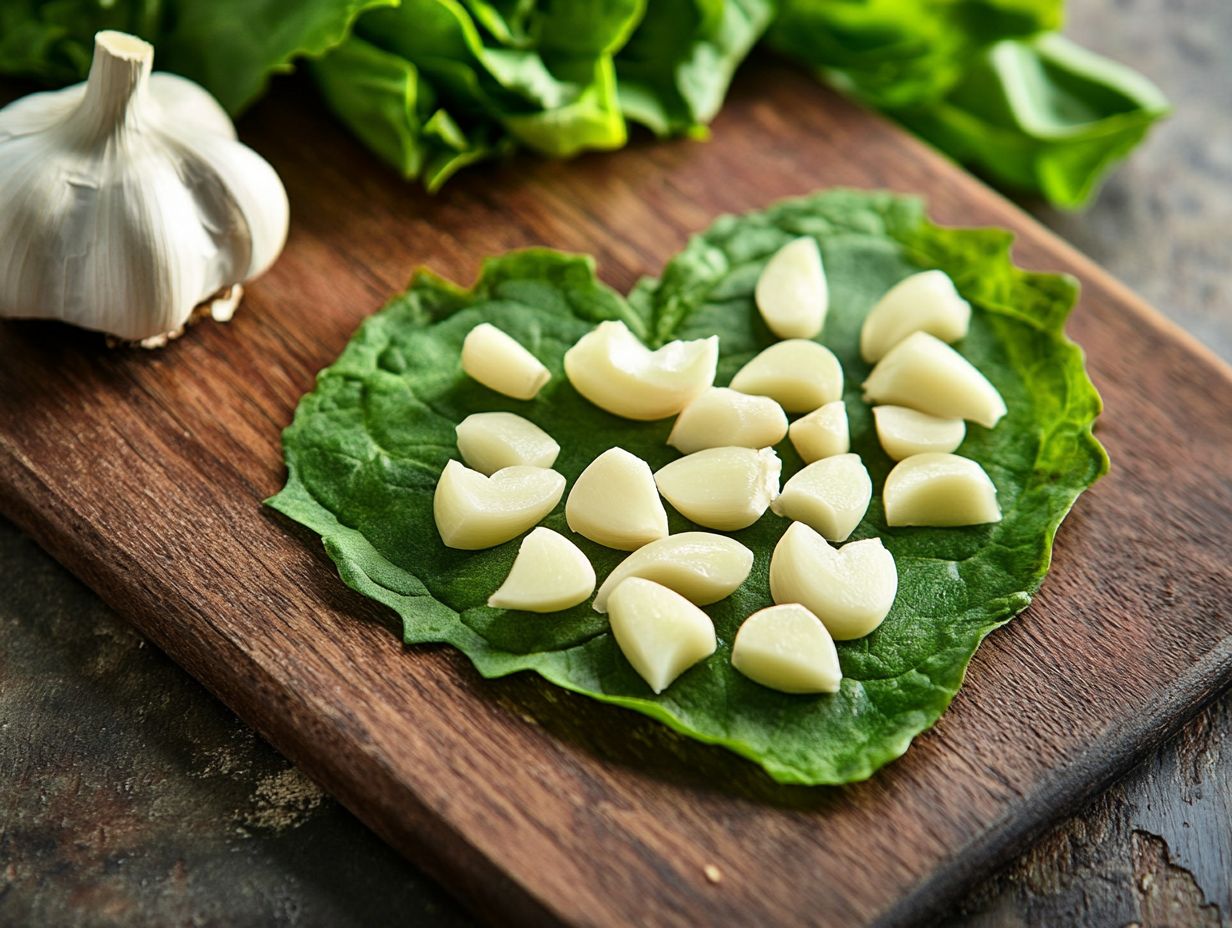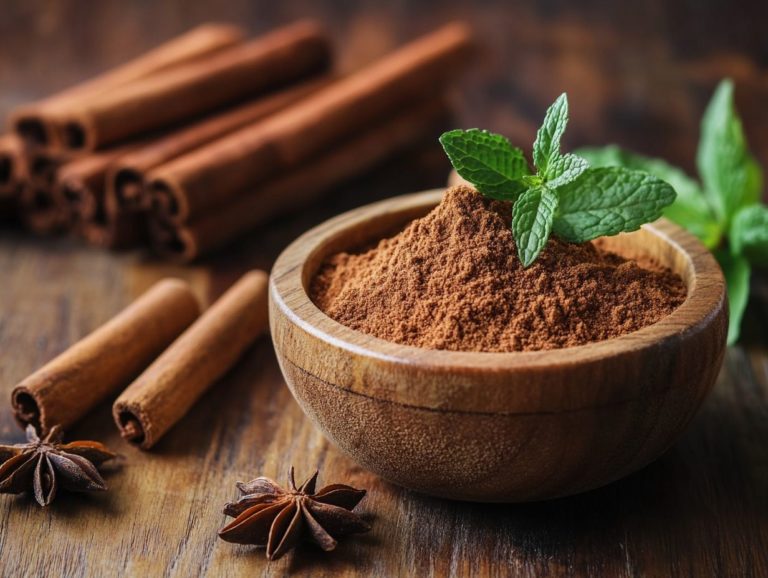The Role of Garlic in Heart Health
Garlic has been celebrated for centuries for its delightful flavor and remarkable health benefits. It’s particularly beneficial for heart health and managing blood sugar.
Rich in powerful natural compounds, garlic plays a pivotal role in enhancing cardiovascular wellness.
In this exploration, you’ll discover garlic s nutritional profile and fascinating history. We’ll delve into its specific effects on heart health and culinary uses.
Learn how garlic can lower blood pressure and cholesterol levels. It also helps prevent serious conditions like atherosclerosis.
Get ready to explore how to incorporate garlic into your diet safely and effectively.
Join us on this journey as we unveil ways garlic can elevate your heart health. We will also highlight essential precautions based on dietary recommendations.
Contents
- Key Takeaways:
- How Garlic Affects Heart Health
- Benefits of Garlic for Heart Health
- Incorporating Garlic into Your Diet
- Precautions and Interactions
- Frequently Asked Questions
- What is the role of garlic in heart health?
- How does garlic help to lower blood pressure?
- Can garlic improve cholesterol levels?
- Is there a recommended amount of garlic to consume for heart health benefits?
- Can garlic supplements provide the same heart health benefits as consuming fresh garlic?
- Are there any potential risks or side effects of consuming garlic for heart health?
Key Takeaways:

- Garlic can improve heart health by reducing blood pressure and cholesterol levels. It may help prevent atherosclerosis and heart disease.
- Key compounds in garlic, like allicin, promote healthy blood flow and reduce inflammation, enhancing cardiovascular health.
- Incorporating garlic into your diet through cooking or supplements is a simple way to enjoy its heart-healthy benefits.
Overview of Garlic’s Nutritional Profile and History
Garlic, the pungent bulb found in kitchens worldwide, boasts a rich nutritional profile. It’s packed with vital compounds that support cardiovascular health.
Historically, garlic has been cherished not just for its flavor but also for its potential health benefits. It plays a significant role in managing hypertension.
This exceptional herb has enhanced various cuisines, from Mediterranean to Asian. In ancient cultures, garlic was not just a cooking staple but also a part of herbal medicine.
Its antioxidant properties combat oxidative stress and chronic diseases. Today, garlic is celebrated by culinary enthusiasts and health-conscious individuals alike.
How Garlic Affects Heart Health
Garlic is a star player in nutritional research due to its strong influence on heart health. It lowers the risk of cardiovascular disease through various mechanisms.
Research shows that adding garlic to your diet significantly contributes to heart health. It is a valuable addition to dietary patterns like the Mediterranean diet.
Key Compounds and Mechanisms
Key compounds in garlic, like allicin and sulfur compounds, contribute to its amazing health benefits. They are especially effective in improving cholesterol levels and reducing risks related to cardiovascular health.
These compounds work in harmony to help lower blood pressure, improve cholesterol levels, and reduce cardiovascular risk factors, all of which are crucial for managing heart disease.
Garlic extract also boosts blood circulation, ensuring that nutrients are delivered efficiently throughout your body. Packed with antioxidants, garlic helps combat oxidative stress, a major player in heart-related issues. By reducing inflammation and promoting the widening of blood vessels, these potent sulfur compounds create a heart-friendly environment.
Incorporating garlic into your diet regularly can lead to significant improvements in vascular function. This gives you the power to maintain a healthier heart and decreases the likelihood of future health issues, supported by clinical trials.
Benefits of Garlic for Heart Health

The benefits of garlic for heart health are abundant and well-established. It not only lowers cholesterol levels but also effectively manages blood pressure, making it a formidable ally in cardiovascular prevention.
A wealth of clinical trials underscores these health advantages. By incorporating garlic into your diet, you can significantly diminish your risk of heart disease and enhance your overall cardiovascular well-being.
Reducing Blood Pressure and Cholesterol Levels
Garlic has proven to be an effective ally in your quest for better cardiovascular health. It significantly reduces blood pressure and cholesterol levels. By using this natural remedy, particularly if you’re managing hypertension, you can harness the power of its active compounds most notably allicin. This remarkable compound works by relaxing blood vessels, which lowers blood pressure, while also aiding in the reduction of unhealthy cholesterol levels through thoughtful dietary choices.
Recent clinical studies affirm these impressive benefits. Regular garlic consumption can lead to meaningful declines in both systolic and diastolic blood pressure. Research also highlights garlic’s ability to modulate lipid profiles, reinforcing its role in the prevention of atherosclerosis.
Integrating garlic into your diet be it fresh, powdered, or in oil form may present a simple yet effective strategy for bolstering heart health. Nutritionists advocate for the inclusion of such natural supplements as essential components of a comprehensive approach to enhancing cardiovascular well-being.
Preventing Atherosclerosis and Heart Disease
Garlic serves as a remarkable ally in the fight against atherosclerosis and heart disease. By enhancing blood circulation and reducing arterial plaque buildup, it lowers your cardiovascular risk. The health benefits of garlic are well-documented in numerous nutritional studies, showing that regular consumption can significantly aid in maintaining heart health and warding off serious cardiovascular conditions.
Research highlights that the active compounds in garlic, especially allicin, can improve endothelial function and reduce inflammation both vital for a healthy heart and essential for dietary control. Studies suggest that individuals who incorporate garlic into their diets may enjoy lower cholesterol levels and improved blood pressure. By adding this versatile ingredient to your meals, you not only elevate flavors but also actively contribute to your cardiovascular wellness and heart disease prevention.
Therefore, making garlic a staple in your kitchen can be a delicious way to support your heart health while reducing the risk of developing heart-related diseases.
Incorporating Garlic into Your Diet
Incorporating garlic into your diet is not only effortless but also highly advantageous for managing cholesterol and blood pressure. You can embrace this culinary gem in a variety of forms, from fresh cloves to garlic powder and even garlic supplements, making it a versatile ally in any dietary regimen.
The Mediterranean diet, renowned for its focus on wholesome eating, often showcases garlic as a foundational ingredient. This elevates both the flavor and nutritional profile of your meals.
Cooking with Garlic

Cooking with garlic elevates the flavor of your dishes. It also allows you to tap into its many health benefits, making it a go-to choice for both culinary enthusiasts and health-conscious individuals.
You can use garlic in various forms fresh cloves, garlic oil, or garlic powder each bringing its unique flair and nutritional perks. This enhances your health benefits across the board.
Imagine the aromatic allure of saut ed garlic in olive oil. Or consider the rich taste of roasted garlic spread on crusty bread. This versatile ingredient has the power to transform any meal while ensuring you meet dietary guidelines.
Whether you re crafting marinades for meats, whipping up creamy dips, or blending it into fragrant stews, garlic’s adaptability shines through every cooking method you employ. Beyond being a flavor powerhouse, garlic is packed with antioxidants and compounds that may support heart health and bolster immune function.
Incorporating this potent ingredient into your daily cooking not only tantalizes your taste buds but also paves the way for healthier dietary habits. It helps manage your blood fat levels.
Supplement Options and Dosages
Garlic supplements provide a convenient pathway to enjoy the numerous health benefits of garlic without the hassle of extensive cooking or preparation. Consider the appropriate dosages to ensure heart health and manage cardiovascular risk.
These supplements come in various forms:
- Capsules
- Soft gels
- Powders
Each is tailored to fit different preferences and lifestyles. For example, capsules generally offer concentrated doses, while powders provide versatility for mixing into your favorite foods or beverages.
Health experts often recommend dosages ranging from 600 to 1,200 milligrams daily. Keep in mind that variations may depend on the specific product and its formulation.
Rich in allicin, a compound in garlic that has health benefits, garlic supplements are renowned for their potential to lower blood pressure, improve lipid profiles, and enhance overall cardiovascular function. This makes them an attractive choice for anyone looking to strengthen their heart health.
Precautions and Interactions
While garlic is renowned for its myriad health benefits, it s essential to take certain precautions and be mindful of potential side effects and interactions with medications, particularly if you’re managing existing health conditions. Consulting with a registered dietitian or healthcare provider can be invaluable in mitigating risks and ensuring that your garlic consumption remains safe and beneficial.
Start incorporating garlic today for a healthier lifestyle!
Possible Side Effects and Interactions with Medications
Garlic can cause some side effects like digestive discomfort and allergic reactions. It may also interact with specific medications, such as anticoagulants, affecting your health.
Be aware that garlic enhances the effects of certain blood-thinning medications. This can increase the risk of excessive bleeding. You might also experience gastrointestinal symptoms, such as gas, bloating, or heartburn, when adding garlic to your diet.
If you take medication for hypertension or glucose control, consult your healthcare provider. Garlic may change how these treatments work, so it s essential to know about these interactions for safe dietary choices.
Frequently Asked Questions

What is the role of garlic in heart health?
Garlic has many benefits for heart health. It can lower blood pressure, improve cholesterol levels, and reduce the risk of heart disease and stroke.
How does garlic help to lower blood pressure?
Garlic contains compounds that relax blood vessels. This allows for better blood flow and lowers blood pressure.
Can garlic improve cholesterol levels?
Yes, studies show that eating garlic regularly lowers levels of LDL (“bad”) cholesterol and raises levels of HDL (“good”) cholesterol. This helps reduce heart disease risk.
Is there a recommended amount of garlic to consume for heart health benefits?
The suggested amount is usually 2-3 cloves of garlic daily. Always check with a healthcare provider before making big diet changes.
Can garlic supplements provide the same heart health benefits as consuming fresh garlic?
Garlic supplements may have some benefits, but they often lack the potency of fresh garlic. Eating fresh garlic is generally recommended for the best heart health results.
Are there any potential risks or side effects of consuming garlic for heart health?
For most people, garlic is safe to eat. However, it can interact with medications like blood thinners and may cause digestive issues or bad breath. Always consult your healthcare provider before adding garlic to your diet, especially if you are on medication.






